#Robotic process automation benefits
Explore tagged Tumblr posts
Text
Unlocking Efficiency and Innovation: The Role of Robotic Process Automation (RPA)
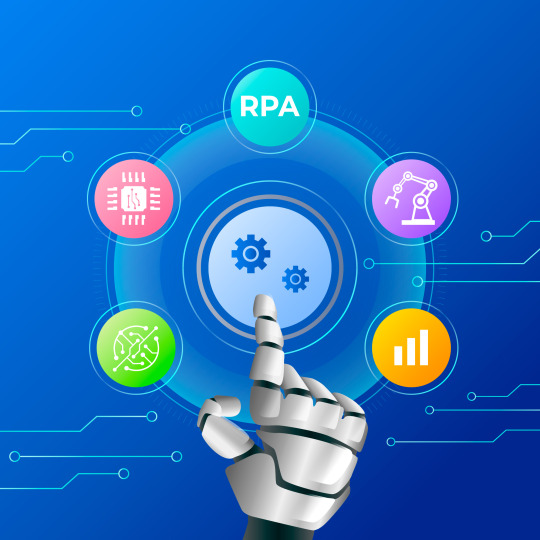
In today's fast-paced and competitive business environment, organizations are constantly seeking ways to improve efficiency, reduce costs, and increase productivity. Robotic Process Automation (RPA) has emerged as a powerful tool that can help businesses achieve these objectives.
What is Robotic Process Automation (RPA)?
Robotic Process Automation (RPA) is a technology that allows businesses to automate repetitive, rule-based tasks. It uses software robots, also known as "bots," to mimic human actions and interact with digital systems. These bots can log into applications, navigate through screens, input data, and complete tasks just like humans would.
The Role of RPA in Business:
RPA can be used to automate a wide range of tasks across various industries and departments. Here are some examples:
Finance and Accounting: Automating tasks such as accounts payable and receivable, invoice processing, and financial reporting.
Customer Service: Automating tasks such as answering FAQs, resolving customer inquiries, and processing orders.
Human Resources: Automating tasks such as onboarding new employees, processing payroll, and managing benefits.
IT: Automating tasks such as provisioning accounts, managing user access, and deploying software updates.
Impact of RPA on Businesses:
Implementing RPA can offer numerous benefits to businesses, including:
Increased efficiency and productivity: RPA can automate time-consuming and tedious tasks, freeing up employees to focus on more strategic and value-added activities.
Reduced costs: RPA can help businesses save money on labor costs, as well as reduce errors and compliance risks.
Improved accuracy and compliance: RPA bots are programmed to follow specific rules and procedures, which can help to improve accuracy and compliance with regulations.
Enhanced process visibility and control: RPA provides businesses with a clear view of their processes, which can help them identify and address bottlenecks.
Improved customer satisfaction: RPA can help businesses improve customer satisfaction by automating tasks such as order processing and customer service interactions.
RPA Services:
Implementing RPA successfully requires a partner with expertise in the technology and a deep understanding of business processes. A comprehensive RPA solution should include the following services:
Document AS-IS Process: This involves mapping out the existing process to identify areas for automation.
Design & Development of Bots, workflows, and forms for process automation: This includes designing and developing the software robots that will automate the tasks.
Bot license (We will use the appropriate underlying technology): This provides access to the software robots and the underlying technology platform.
Infrastructure: This includes setting up the necessary infrastructure to support the Robotic Process Automation (RPA) solution.
Production Deployment of the Bots: This involves deploying the bots to production and monitoring their performance.
RPA support: This includes ongoing support for the RPA solution, such as troubleshooting and maintenance.
Test & Deploy bots to production: This involves testing the bots in a production environment and making any necessary adjustments before they are deployed to full production.
Configuration data changes: This involves making changes to the configuration data of the bots as needed.
Password updates: This involves updating the passwords of the bots as needed.
Errors in executing the Bots: This involves resolving errors that occur during the execution of the bots.
Determining the “root cause” of a recurring issue or incident & recommendations: This involves identifying the root cause of a recurring issue or incident and recommending solutions to prevent it from happening again.
Infrastructure/application related issues: This involves resolving issues with the infrastructure or applications that the bots are interacting with.
Conclusion:
RPA is a powerful technology that can have a significant impact on businesses of all sizes. By automating repetitive tasks, RPA can help businesses improve efficiency, reduce costs, and increase productivity. However, it is important to choose a reputable Robotic Process Automation (RPA) companies with the expertise and experience to help you implement a successful RPA solution.
Ready to embrace the power of RPA?
Contact us today to learn more about how RPA can help your business achieve its goals.
#robotic process automation#robotic process automation rpa#rpa automation#robotic process automation software#rpa software#robotic process automation companies#robotic process automation technology#robotic process automation in healthcare#robotic process automation in banking#rpa solution#robotic process automation for finance#process automation solution#robotic process automation services#robotic process automation for insurance#rpa system#what is rpa automation#robotic process automation solution#robotic process automation benefits#robotic process automation consulting#robotic process automation consultant#rpa service provider#rpa consulting services
2 notes
·
View notes
Text

Role Of RPA In Healthcare Industry
Robotic Process Automation (RPA) is transforming the healthcare industry by automating repetitive tasks like patient data entry, billing, and appointment scheduling. It improves accuracy, enhances productivity, and reduces operational costs. RPA's use cases include insurance claims processing, inventory management, and real-time patient monitoring. Its benefits include faster workflows, reduced errors, and better patient care.
For robust RPA healthcare solutions, USM Business Systems is the leading mobile app development company.
USM Business Systems
Services:
Mobile app development
Artificial Intelligence
Machine Learning
Android app development
RPA
Big data
HR Management
Workforce Management
IoT
IOS App Development
Cloud Migration
#RPA in healthcare#Healthcare automation apps#Benefits of RPA apps#Healthcare automation tools#Robotic process automation benefits#RPA use cases in healthcare#RPA healthcare applications#RPA for patient care#Automation in medical billing
0 notes
Text
Key Benefits of RPA for Enterprises: Boosting Efficiency & Cutting Costs
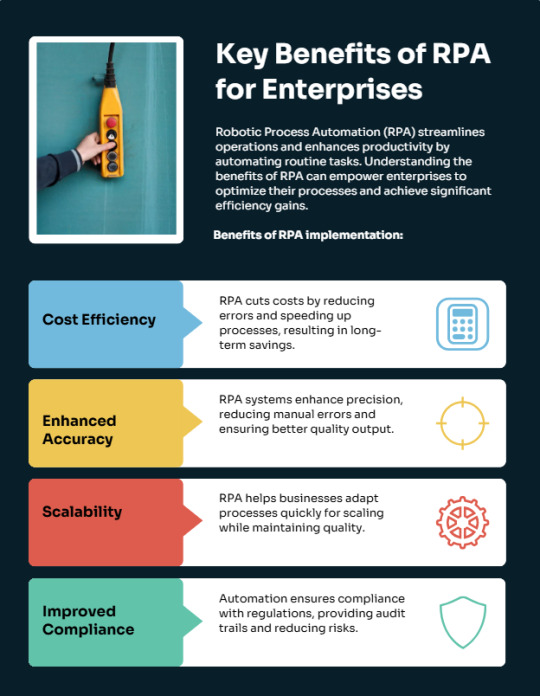
Discover how Robotic Process Automation (RPA) enhances efficiency, reduces operational costs, minimizes errors, and accelerates workflows. This infographic highlights the top advantages of RPA, from improved compliance to better scalability for businesses.
0 notes
Text
14 Key Benefits of Business Process Automation
Process automation offers numerous benefits that can significantly impact businesses and organizations. Some of the key benefits of process automation include:
Increased Efficiency: Automation reduces the need for manual intervention in repetitive tasks, leading to faster and more streamlined processes. This allows employees to focus on more strategic and value-added activities, improving overall productivity.
Cost Savings: Automated processes can lead to significant cost savings by reducing labor costs, minimizing errors, and optimizing resource allocation. It reduces the need for human resources to perform repetitive tasks.
Improved Accuracy and Quality: Automation minimizes the chances of human errors, ensuring a higher level of accuracy and consistency in operations. This results in improved overall quality of products and services.
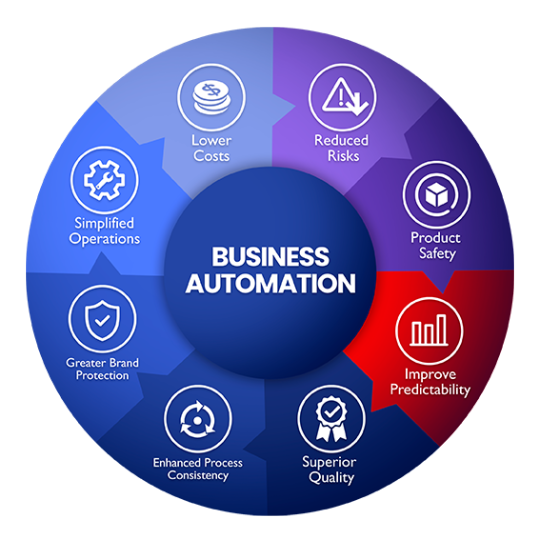
Consistency and Standardization: Automation ensures that processes are executed consistently according to predefined rules and standards. This standardization leads to uniform outcomes and better customer experiences.
Faster Process Execution: Automated processes can operate 24/7 without breaks, resulting in faster task execution and quicker response times to customer needs and market changes.
Enhanced Compliance: Process automation helps businesses adhere to industry regulations and internal policies by enforcing standardized procedures and generating accurate documentation.
Scalability and Flexibility: Automated processes can easily handle an increased workload without the need for significant adjustments, making them scalable and adaptable to changing business needs.
Improved Data Management and Insights: Automation generates data and analytics that provide valuable insights into process performance. Making data-driven decisions and locating bottlenecks can both benefit from these insights.
Enhanced Customer Experience: Automation can lead to faster response times and improved customer service. Features like automated emails, chatbots, and self-service portals can provide immediate support to customers.
Streamlined Collaboration: Automation facilitates better collaboration between different departments and teams by automating workflows and ensuring seamless information flow.
Business Agility: Automation enables businesses to respond quickly to market changes and opportunities, allowing for faster adaptation and decision-making.
Time Savings: Automated processes can save considerable time, allowing organizations to complete tasks and deliver products or services more quickly to customers.
Competitive Advantage: Embracing process automation can give a company a competitive edge by enabling faster, more efficient, and cost-effective operations, leading to better customer satisfaction and retention.
Employee Satisfaction: By automating repetitive and mundane tasks, employees can focus on more challenging and creative work, leading to higher job satisfaction and engagement.
Overall, process automation can transform how businesses operate by optimizing workflows, increasing productivity, and enhancing overall performance. However, it's crucial to carefully plan and implement process automation to ensure it aligns with the organization's goals and processes. Additionally, continuous monitoring and improvements are essential to maintaining the effectiveness of automated processes over time.
#process automation#ai automation#what is automation#Cambay#Robotic Process Automation#Business Process Automation#Benefits of process automation
0 notes
Text
AI can’t do your job

I'm on a 20+ city book tour for my new novel PICKS AND SHOVELS. Catch me in SAN DIEGO at MYSTERIOUS GALAXY on Mar 24, and in CHICAGO with PETER SAGAL on Apr 2. More tour dates here.

AI can't do your job, but an AI salesman (Elon Musk) can convince your boss (the USA) to fire you and replace you (a federal worker) with a chatbot that can't do your job:
https://www.pcmag.com/news/amid-job-cuts-doge-accelerates-rollout-of-ai-tool-to-automate-government
If you pay attention to the hype, you'd think that all the action on "AI" (an incoherent grab-bag of only marginally related technologies) was in generating text and images. Man, is that ever wrong. The AI hype machine could put every commercial illustrator alive on the breadline and the savings wouldn't pay the kombucha budget for the million-dollar-a-year techies who oversaw Dall-E's training run. The commercial market for automated email summaries is likewise infinitesimal.
The fact that CEOs overestimate the size of this market is easy to understand, since "CEO" is the most laptop job of all laptop jobs. Having a chatbot summarize the boss's email is the 2025 equivalent of the 2000s gag about the boss whose secretary printed out the boss's email and put it in his in-tray so he could go over it with a red pen and then dictate his reply.
The smart AI money is long on "decision support," whereby a statistical inference engine suggests to a human being what decision they should make. There's bots that are supposed to diagnose tumors, bots that are supposed to make neutral bail and parole decisions, bots that are supposed to evaluate student essays, resumes and loan applications.
The narrative around these bots is that they are there to help humans. In this story, the hospital buys a radiology bot that offers a second opinion to the human radiologist. If they disagree, the human radiologist takes another look. In this tale, AI is a way for hospitals to make fewer mistakes by spending more money. An AI assisted radiologist is less productive (because they re-run some x-rays to resolve disagreements with the bot) but more accurate.
In automation theory jargon, this radiologist is a "centaur" – a human head grafted onto the tireless, ever-vigilant body of a robot
Of course, no one who invests in an AI company expects this to happen. Instead, they want reverse-centaurs: a human who acts as an assistant to a robot. The real pitch to hospital is, "Fire all but one of your radiologists and then put that poor bastard to work reviewing the judgments our robot makes at machine scale."
No one seriously thinks that the reverse-centaur radiologist will be able to maintain perfect vigilance over long shifts of supervising automated process that rarely go wrong, but when they do, the error must be caught:
https://pluralistic.net/2024/04/01/human-in-the-loop/#monkey-in-the-middle
The role of this "human in the loop" isn't to prevent errors. That human's is there to be blamed for errors:
https://pluralistic.net/2024/10/30/a-neck-in-a-noose/#is-also-a-human-in-the-loop
The human is there to be a "moral crumple zone":
https://estsjournal.org/index.php/ests/article/view/260
The human is there to be an "accountability sink":
https://profilebooks.com/work/the-unaccountability-machine/
But they're not there to be radiologists.
This is bad enough when we're talking about radiology, but it's even worse in government contexts, where the bots are deciding who gets Medicare, who gets food stamps, who gets VA benefits, who gets a visa, who gets indicted, who gets bail, and who gets parole.
That's because statistical inference is intrinsically conservative: an AI predicts the future by looking at its data about the past, and when that prediction is also an automated decision, fed to a Chaplinesque reverse-centaur trying to keep pace with a torrent of machine judgments, the prediction becomes a directive, and thus a self-fulfilling prophecy:
https://pluralistic.net/2023/03/09/autocomplete-worshippers/#the-real-ai-was-the-corporations-that-we-fought-along-the-way
AIs want the future to be like the past, and AIs make the future like the past. If the training data is full of human bias, then the predictions will also be full of human bias, and then the outcomes will be full of human bias, and when those outcomes are copraphagically fed back into the training data, you get new, highly concentrated human/machine bias:
https://pluralistic.net/2024/03/14/inhuman-centipede/#enshittibottification
By firing skilled human workers and replacing them with spicy autocomplete, Musk is assuming his final form as both the kind of boss who can be conned into replacing you with a defective chatbot and as the fast-talking sales rep who cons your boss. Musk is transforming key government functions into high-speed error-generating machines whose human minders are only the payroll to take the fall for the coming tsunami of robot fuckups.
This is the equivalent to filling the American government's walls with asbestos, turning agencies into hazmat zones that we can't touch without causing thousands to sicken and die:
https://pluralistic.net/2021/08/19/failure-cascades/#dirty-data

If you'd like an essay-formatted version of this post to read or share, here's a link to it on pluralistic.net, my surveillance-free, ad-free, tracker-free blog:
https://pluralistic.net/2025/03/18/asbestos-in-the-walls/#government-by-spicy-autocomplete

Image: Krd (modified) https://commons.wikimedia.org/wiki/File:DASA_01.jpg
CC BY-SA 3.0 https://creativecommons.org/licenses/by-sa/3.0/deed.en
--
Cryteria (modified) https://commons.wikimedia.org/wiki/File:HAL9000.svg
CC BY 3.0 https://creativecommons.org/licenses/by/3.0/deed.en
#pluralistic#reverse centaurs#automation#decision support systems#automation blindness#humans in the loop#doge#ai#elon musk#asbestos in the walls#gsai#moral crumple zones#accountability sinks
277 notes
·
View notes
Text
I've had a number of jobs that I would consider blue collar, mostly when I was younger, just not skilled blue collar work. I worked at my uncle's landscaping company for a summer (planting bushes, repotting stuff, watering plants), and on my other uncle's farm for a few years (feeding animals, helping hook up equipment, being an extra pair of hands, doing a lot of the various odd jobs that farming seems to consist of). I was a janitor for two years when I was taking a break from college, and did enough manual labor that I had some actual muscles from it.
When I worked as a janitor, one of my duties was to bale cardboard, which means taking all the cardboard generated by the store and placing it into a baler, having it crushed flat in bulk, then tying the bale of cardboard up with wire so it could be placed in a corner of the loading bay and later, shipped of somewhere else for processing. I imagine that before the baler was invented, this was a lot more labor, and even with the baler it felt like a significant amount of labor. And I did always think that it could have been easier, simpler, faster, except that it was cheaper for a human to do everything. Even the very primitive baler probably cost thousands of dollars, and it was just a glorified hydraulic press. But I didn't respect the work, and would have been happy for that to no longer be a thing that humans had to do.
I guess my opinion on automation is that it's generally good insofar as it means that people can stop doing things that they would rather not be doing, things that they do because they've been coerced into doing them for money.
But I do think there's something to working with your hands and seeing some tangible results from your labor. I took wood shop in high school, and every now and then I have cause to use those skills for something, even if I am outcompeted by giant factories that can make the same things by the hundreds with better precision. There's also the question of customization: my wife is far more handy than I am, and is always making little custom things for us, either 3D printed or with tools at the local Makerspace that she helps run. I think it's good to look back at something you've done and being able to say "yes, I have done that". And of course there are other ways to compete against a factory that's shitting out things by the thousands, and not just by having things bespoke: there are things that benefit from not having to be made in quantity, or with fresh ingredients, or locally sourced products.
I guess there are a lot of things that I would replace with robots, if I could, but also a lot of things that I wouldn't, because I place some value on doing them myself, or having a process that I can control, or an end product I can take credit for.
We're entering a new era of automation, assuming that AI doesn't just fail and escape from the public consciousness like a weak fart. I'm hopeful that it can kill a lot of grunt work, things that people didn't ever want to be doing, and worried that it will kill the kinds of enriching labor that people actually enjoy. But of course I worry that it's going to be like a lot of automation has been, making an inferior product at prices so low that only the very rich can afford what humans do.
43 notes
·
View notes
Text
d&d robot wizard named Intellibeam Laserstation
(page 1555-1572)

It’s feeling so Act 2 up in here because we are seeing a couple of kids try to figure out Sburb mechanics while being equal parts competent and silly.
But first, a revelation that Jack Noir has ‘a policy of handing out a REGISWORD and a HITLIST to just about everyone who enters your office’ (p.1555). This is in my homestuck jokes hall of fame because it’s a sudden punch of absurdity that adds to the plot and characterization, instead of detracting from them. I think the jokes that don’t hit for me tend to be when a character uses a phrase format or SBAHJ reference that feels out of character for them to say, or when a joke replaces what could be a character moment (for example, p.444). This joke contributes to Jack’s amorality and clear-headedness while inciting disproportionate violence, and preserves PM’s character arc, since it’s significant if she’s the only recipient of this hitlist who actually carries it out.
It sucks that the Queen keeps Jack locked behind a desk watching other people when he has this much flair and style. He should be on the stage. Also I cannot imagine the damage PM would inflict upon Jack if she saw him open that package that isn’t addressed to him. That’s a MAIL CRIME and I for one am not even curious what’s inside until the package reaches its ADDRESSED recipient.


Dave and Jade are a fun combination of Sburb players, because Dave has no concerns with playing the game ‘correctly’ and is willing to go with whatever makes things easier, while Jade has the inventor’s curiosity and wants to exploit hacks and glitches to advance as fast as possible. And Dave may have made fun of Jade for her ‘goofy modusses’ (p.382) but he is definitely benefiting from them now. Jade doesn’t play many games (p.442, 1400) but has spent her whole life engaging with Skaian technology, which is essentially ‘tech that functions on video game logic’ [sidenote: this definition made me decide that the sylladex is also 100% Skaian tech] so I think this helps her intuit how Sburb works.
The ability to alchemize the alchemiter feels right and correct. Alchemiter upgrades and add-ons allow for more complexity in the mechanics without needing more machines than would be practical to work with, just like how Sburb’s Atheneum (p.620) can store previously carved totems so that it’s not necessary to retain the physical objects. It seems like if enough machines are combined into one, the physical steps (moving around, handling and carving cruxite and cards) will be eliminated and the whole process will be automated. On a story level, it allows for power scaling as an upgrade can be anything, and there’s less concern for the time and space that a task takes – small developments like this and the suggestion of transportalizers between planets (p.1531) are still expanding the scope of the story.
I think a portable alchemiter would be a great next step. Gotta have a punch card for a little backpack and then Dave can carry this around while exploring his planet and he won’t end up like John, in a land of copper giclopses far away from weapon upgrades.
But what I love about Sburb is that it doesn’t care if an update is helpful. It lets the players make bad and nonsensical decisions and incorporates them into its logic. It’s open world and if you want a blender or a GameBro bust on your alchemiter then you can. It’s the difference between a game that makes an error sound if your strength is too low to equip the Ultra Greatsword and a game that lets you equip it and then just be a shitty fighter.
Dave struggling for space on page 1563 made me wonder about the smallest space needed to play Sburb. Its name suggests a full house, but a large room, like a well kept studio apartment, might have room. But a dorm room or houseboat or RV or nursing home or hospital simply would not work without modifications, and the idea of playing Sburb in unconventional living spaces is really interesting to me. Maybe if I write fanfiction it will be about that since it seems outside the scope of the comic at this point.
There’s no WAY we find out what the intellibeam laserstation does any time soon – this reveal is definitely getting saved, which leaves room for speculation! ‘Intelli’ comes from intelligence or intelligible, ‘beam’ and ‘laser’ both suggest a highly precise and advanced ray of light, and ‘station’ is a designated place for an activity (or a regular stopping point, and now I am imagining a train station for lasers). So, this is intelligent light, light that can shape and direct itself according to what it’s needed for? Or it’s light that can itself be used as a resource or material, a place for creating light or building with it? Light is a theoretically infinite resource, so could tie into Skaia’s ‘unlimited creative potential’ (p.422). It could even be involved in creating constructs – things with an intelligence of their own – giving lategame players the ability to alchemize their own light kingdom agents to combat the dark.


#homestuck#reaction#SHORT POST !! for once#i was away from my current city for two months and in that time my favorite local pizza place has started making Butter Paneer Pizza#which is garlic butter base (no red sauce) paneer jalapenos fresh cilantro crispy onions mango chutney and cheese#it might be the best thing ive ever eaten but im FLAT broke and cant afford takeout ever again#but huge shout out to the genius behind this recipe all the same#chrono
21 notes
·
View notes
Text
don't let the bad news (evil executive orders, play by play of obvious corrupt schemes, etc.) tire you out but here's the thing.
this is not the time to 'wait,' or 'hunker down' or 'take a break.'
I know that fact plays havoc with people who have anxiety, or have ADHD or experience mania, etc. It can be difficult for many people to handle 'urgency' without it feeling like
they are being screamed at maximum volume to have already done 'everything'
but also to do it right now
and also they're already a failure
and also they can fail worse or harder, etc. etc.
I understand these feelings. But we must navigate urgency now and fragility is unfortunately not an option. Increasingly 'breaking' doesn't mean another adult fixes it for you, it means 'swept into the trash.' I understand that many people need support to confront this reality, but accessing that support also takes work, unlike an algorithm it will never 'find you.' Not falling through the cracks is not always voluntary but we want to maximize the cases where it is.
And we can talk about how the removal of safety nets is a strategy to ensure as many people smash against the ground as possible. But not on this post.
The thing is, there is no material difference between the behavior that a violent ruling party wants us to do (stay put due to obedience) and the action that the 'freeze' reaction to danger wants us to do (stay put to conserve energy/endure pain).
Even if we frame it as 'needing a rest' or 'self-care,' every significant delay to critical tasks is still a delay that could have an impact on us. Moving forward is self care right now, and will be community care if we do it in groups.
It is the strategy of oppression to make moving at all feel so overwhelming that you believe you only have the strength to hide away as they do whatever they want.
Many people will relinquish their autonomy this way, sometimes even actively.
the creepy tradwife lifestyle is bait for overwhelmed women, that a Husband will take half of the artificially overwhelming responsibility of independence away from you, in exchange for being a robot that automates HIS independence. Which he believes he needs, if he can't afford to pay a servant!
The military benefits when poverty is un-survivable with dead ends, to-dos, shit jobs, waiting lists, especially for people who have been screwed over education, that giving yourself to a cult seems like a good deal. They house, feed, clothe you, they give you directions in a world that abandoned you! You can trade up 'get a job lazy poor' to 'god bless you for your service!' (don't ask veterans if they can eat that.)
But being overwhelmed can still cause you to give up autonomy passively. Especially if you are alone or feel alone.
You don't need to do everything all at once but make serious (incremental, sane, well-paced) goals to do things you may want to accomplish like
get your bank account or financial stuff sorted out,
apply for a passport,
change your name/get married/similar processes,
get on unemployment (may also require proof of weekly job applications depending on where you live),
go to the doctor,
renew your lease or move house,
whatever you need to do. This isn't an exhaustive list.
Pencil in your Saturdays and don't bail, is what I mean.
Make buddies and teams.
Start a group chat.
Whatever works.
As long as it does and you can hold proof of it. Not a 'I sent an email' or 'i left a message,' you MUST follow up. I'm sorry.
I'm so sorry ok. I know. You're ALREADY doing so many things, I know! Me too. I know it sounds like your parents or like "pull up your pants and clean your room!" or like someone's disappointed in you. But nobody is, or they shouldn't be. And this isn't about bootstraps: nobody will participate collectively if you don't. If you wait for there to be a puller upper group, there won't be one. you have to decide to do that thing tomorrow. Even if you're tired and did so many other things today. You have to tell your friends. I KNOW. I know.
these plans and actions will give you a 'tomorrow' and that is critical right now. It is the whole goal of those who oppose you to deny you that. To make them work for it, we have to also work for ourselves.
36 notes
·
View notes
Text
The Role of Relays and Timers in Industrial Automation Systems

In the world of industrial automation, efficiency, safety, and precision are crucial. Among the many components that contribute to a well-functioning automated system, relays and timers play a foundational role. These devices act as control elements that manage the flow of electricity, signal processes, and coordinate timing sequences — ensuring that operations run smoothly and safely.
In this article, we’ll explore how relays and timers work, their types, applications in automation systems, and how high-quality products — like those offered by Enza Electric — can enhance performance and reliability in industrial settings.
What Are Relays?
A relay is an electromechanical or electronic switch used to control a circuit by a separate low-power signal or multiple signals. In industrial automation, relays act as a bridge between the control system and the equipment being operated — allowing machines to be turned on or off automatically.
Types of Relays Commonly Used in Automation:
Electromechanical Relays (EMRs): Use physical moving parts; reliable and easy to maintain.
Solid-State Relays (SSRs): No moving parts; faster switching, longer lifespan, and better for high-speed applications.
Thermal Overload Relays: Protect motors and equipment from overheating.
Control Relays: Designed for controlling multiple contacts simultaneously in automation systems.
What Are Timers?
Timers are devices used to delay or repeat electrical signals at predetermined intervals. They help synchronize tasks, automate sequences, and provide controlled outputs over time — critical for complex industrial processes.
Common Timer Functions:
On-delay and off-delay timing
Interval timing
Cyclic or repeat cycle operation
Flashing and sequencing operations
Types of Timers:
Analog Timers: Manual dial settings, simple and cost-effective.
Digital Timers: Offer precise programming, displays, and flexible timing ranges.
Programmable Timers: Ideal for complex automation routines requiring multiple sequences.
Key Roles in Industrial Automation Systems
1. Process Control and Sequencing
Relays and timers enable automated machines to follow a specific sequence — turning motors, lights, or pumps on and off in a logical order. For example, a conveyor system can use a relay-timer combination to control material flow with millisecond precision.
2. Safety and Protection
Relays protect systems by interrupting circuits in case of faults. Combined with timers, they can ensure delay before activating emergency stop functions, preventing false triggers and increasing worker safety.
3. Load Management
In high-demand industrial environments, relays help manage load distribution by selectively energizing or de-energizing machinery. Timers assist in staggered starts, reducing power surges.
4. Energy Efficiency
By automating start/stop functions and managing operation durations, timers help reduce unnecessary energy use. Relays ensure only the necessary loads are powered, minimizing wastage.
5. System Monitoring and Feedback
In smart automation, relays provide feedback signals to the control system. Timers assist with diagnostics by creating intervals for testing or data collection.
Benefits of Using High-Quality Relays and Timers
Choosing the right components significantly impacts system performance and longevity. Enza Electric’s relays and timers are engineered with:
High durability for tough industrial environments
Precision timing for reliable operation
Easy installation and compact designs
Compliance with international safety and quality standards
By integrating Enza’s low-voltage solutions, businesses in the GCC, MENA, and Africa regions benefit from cost-effective, scalable automation that supports both current needs and future expansion.
Common Applications in Industrial Sectors
Manufacturing Plants: Control of motors, robotic arms, and production lines.
HVAC Systems: Timed control of fans, compressors, and dampers.
Water Treatment Facilities: Sequenced operation of pumps and valves.
Packaging Machinery: Relay and timer-based coordination of packing, sealing, and labeling.
Food and Beverage Industry: Process automation with hygiene-compliant controls.
Final Thoughts
Relays and timers are the silent operators behind the success of industrial automation systems. From process optimization to enhanced safety and energy management, these components are indispensable.
When sourced from a trusted manufacturer like Enza Electric, businesses are not only investing in reliable hardware but also in the longevity, scalability, and safety of their entire operation.
Ready to Power Your Automation?
Explore Enza Electric’s wide range of relays, timers, and other low-voltage switchgear solutions designed to meet the evolving demands of modern industries. Visit www.enzaelectric.com to learn more or request a quote today.
9 notes
·
View notes
Text
To Catch a Scammer
So, I just recently discovered that I had been speaking to a scammer who posed as a commission customer. Hopefully, by looking through my thought processes and mistakes, it will help others be smarter about conducting their own commissions.
For the ease of storytelling, I think it would be best for me to just go through what happened in chronological order.



So, first off, this person contacted me on March 20. Perhaps the red flags right off the bat are: 1.) Who really says "kindly" unless they're writing an essay or a super formal business letter, and 2.) the blank tumblr profile.
I even remember back then feeling a bit hesitant at the blank profile. Maybe I should have ignored the message right away. And with hindsight, I know that's what I should have done.
It makes you wonder: should the universal rule be that you always ignore requests from users with blank profiles?
Perhaps, but there are real people who do have blank profiles that aren't interested in conducting a scam. My partner is someone who doesn't post on Facebook or Instagram; in fact, his profiles are completely devoid of any pictures and info. He just uses them to follow his friends and coworkers.
So, what then? I think it's really up to you, but I'm personally going to ignore all requests from blank profiles.
I know that a common fear is, "what if I'm wrong, and I potentially ignored a real customer?"
To that, I would say that the possibility of having your time and effort wasted far outweighs the possibility of losing a customer. Thankfully, I didn't go through a lot of work on this scammer's job, but I still feel very upset that my time was wasted to begin with.
I also made the mistake of not reverse-image searching the profile picture, or the picture they sent me as reference, but more on that later.
Anyways, I did send them a message. I figured that I would get confirmation that they were a bot from the way they texted with me.


It seemed like they were responding to what I was actually asking. (So, perhaps this account was being run by a person, and not some automated program?)
My issue is that I tend to give people the benefit of the doubt. Working in retail has shown me that there are so many different kinds of people out in the world. Some who are reasonable and "normal," and some who are just plain weird, but you have to treat them as a customer all the same.
Not everyone responds in a detailed or personality-filled manner.
In fact, in my experience, I realized that's kind of an outlier. Most people tend to be very dry texters, or the type to just respond with as few words as possible. So, I didn't feel as though our subject, Nyben0001, was a robot right off the bat.
In the past, I had an experience with a scammer who disregarded all of my boundaries. They kept messaging me, "hello?" and "are you there?" even after I told them I was out of town and will not be available for business until I got back.
This "person" didn't hound me, and only responded when I did.
However, I think the lesson learned here is that you should not continue an interaction with a potential customer if their messages come across as overly dry and, in my opinion, unnecessarily brief.
One thing to note, which is something I didn't realize until later, was that this person appeared to be chronically online on Tumblr. (As indicated by the green dot) They are even "online" at the moment I'm typing this!
Sure, there are innocent reasons for that, but for a blank profile (no reblogs or anything) to always be online? I don't think so.

This wasn't my first time doing commissions online, and I thought that I put together a pretty good safeguard to weed out the potential scammers.
As mentioned in the screenshot, I created a Google Form for every potential customer to fill out. It wasn't just multiple choice answers; I required that they type out what they wanted from the commission. That way, I thought I'd be able to determine who was a real customer vs a bot or scammer. Any bot could just type in gibberish or something unrelated to the actual question.
All the questions were mandatory as well, so no one could get away with just sending a blank or partially filled out Form. I thought, surely a scammer didn't have the tools, interest, or patience to actually fill it out.
They actually did fill out my Form, which I thought was a very good sign. I'm going to include the unedited image because fuck this person.


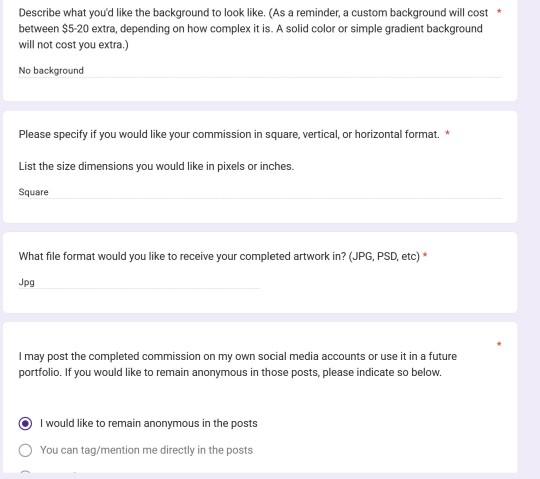
Communication was then moved to email.
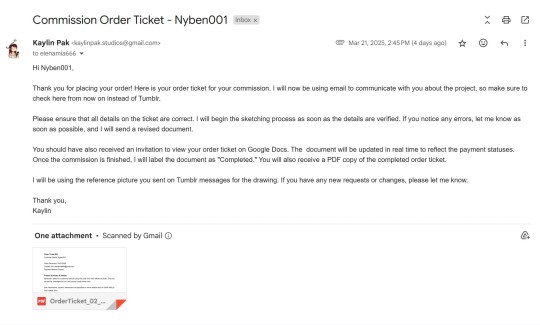
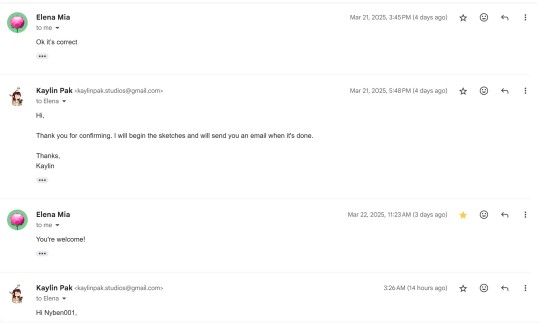
In hindsight, I should have been more put off by the one-word responses, but I've met a few people who treated emails almost as though they are text messages. They are usually the types who answer emails on their phone. One such person was my former 88-year old professor who I worked under. (Perhaps it's indicative of the actual age and identity of "Elena Mia"?)
This is where the real fuckery started.
I finished the sketches and asked for the first half of the payment to be sent through PayPal. ($7.50) This person then asked for my PayPal email despite being given the actual link to my PayPal page.

I've never had a customer ask me for that, but I honestly thought it was an innocent request. I know there is a discrepancy between the email I listed as my contact info, and the actual email associated with my account. I assumed they needed the email address to find my account on PayPal to send me the money.
You might be thinking, why wouldn't they just click on the link? In the moment, I thought that maybe I accidentally sent the wrong one, or that they felt uncomfortable clicking on some random link from a stranger. (Which I ironically sympathized with)
Most customers tend to pay me within an hour after receiving my Paypal information. Over 12 hours passed, and I got nothing.
That's when I started to worry, and I strongly suspected this was a scammer. I began feeling scared that this person asked me for my PayPal email, so they could try to hack it. I logged in to my PayPal and double checked that nothing was stolen, and none of the account activity seemed suspicious.
I slightly calmed down, then treated the situation as though I still was talking to a person.

Suspicious font change aside, I didn't receive any email notification that "Elena" paid me. PayPal always sends me an email whenever someone sends me money.
But, what I DID receive through my PayPal email was very interesting.

There's a lot going on, but let's point out all the suspicious details one at a time.
For starters, this is not PayPal's service email. I recognized that right off the bat because I DO receive legitimate emails from PayPal quite often. THIS is the email address PayPal uses.

Second, I did not receive any $7.50 payment from anyone called "Mara David." Third, who the fuck is Mara David? I thought I was talking to someone called Elena Mia?
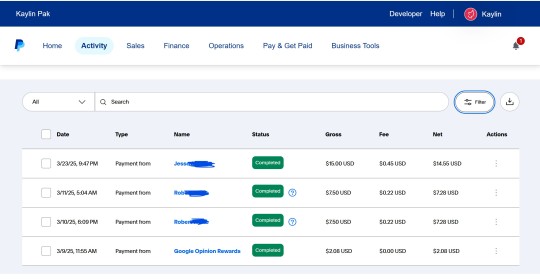
Lastly, what even is this pea-brained issue that "PayPal" is claiming? So, if the situation is that Mara/Elena sent me $7.50, but PayPal can't process it because I don't have a business account, why in the ever loving HELL would the solution be that I pay HER $100? And, oh, when I DO pay her the $100, I'll somehow be paid back my $100 AND the $7.50 for the commission.
I'm at a loss for words at how stupid this scheme is.
The real icing on the cake was that "Nyben0001" actually left a comment for me yet AGAIN earlier today, March 25.

Makes you wonder if this person is just using a bot of some kind, otherwise, they literally forgot that they already contacted me, lmao.
I know it was unnecessary, but I then essentially told them to go fuck themselves. I honestly should have been meaner.

So, that's that. Good riddance to bad rubbish. Now, let's talk about safeguarding steps.
I mentioned near the beginning of the post that I didn't do any reverse-image searching. It honestly wasn't something that crossed my mind. But it definitely is a step that everyone should take if or when you feel suspicious about a person's profile.
These are the images I had to work with regarding this particular person. With hindsight, they do look like different people, but when you assume you're dealing with a real person, you overlook these things.
Even now, aside from the lighting, I wouldn't say they look like drastically different people.


For the first image, when I did a reverse-image search, this is what I found:


For the second image, this is what happened:



Very weird, huh? Maybe if I scrolled long enough, I'd find the original image with the denim jacket, but it's weird how there are no matches when I isolate the face.
My partner suggested that maybe these are AI images. There's nothing that overtly sticks out to me as AI from these pictures, but who really knows. This is one "smart" tactic from the scammer if so.
This is just one example, but I believe there are other scammers who will try the same thing, too. But, as you've seen, just because nothing pops up in the reverse image search, doesn't mean that the person is legit. Scammers, thankfully, have not learned how to actually sound like a real interested customer.
This is my takeaway from this particular situation:
1. Do not ever take work from someone with a blank/empty profile
2. If a potential customer asks YOU to message THEM about the job, there's a very good chance they are a scammer. The majority, if not all, the real customers I've had contacted ME privately first. There are some scammers who do contact you first, but either their profile, or the way they speak to you gives them away.
3. If the majority (I'd say at least 85%) of a person's replies are one-word answers, brief, or unprofessional for the setting, they are a scammer.
4. Do not ever give a customer your PayPal email. The page link should suffice.
5. You can try to reverse-image search their photos to verify their identity, but it honestly shouldn't come to this point if they have a blank profile. And, as you can see, it doesn't appear to be an accurate tell anymore.
6. I still think that the Google Form, or any other similar filter/buffer, is a good way to prevent scammers from ordering work from you. It seems like only the persistent ones are willing to get through it.
Personally, I think Number 1 and 2 are your best bets against protecting yourself from even opening communication with a scammer. Number 4 is also a dead giveaway.
I'd like to add that in my experience, scammers also ask if they can pay you with a check, or they'd make up some random excuse for why they can't use/access their PayPal, Venmo, Zelle, etc account. Don't you believe it!!
Please let me know of your own anti-scammer protection tips. I'd genuinely love to hear them!
#scammers#scam alert#scam warning#commission scams#online scams#scam#art scam#commission#art community#artists helping artists#artists supporting artists
7 notes
·
View notes
Text
📢 Attention all digital marketers and SEO enthusiasts! 🚀
Have you heard about the revolutionary Money Robot Group Buy? 💰💪 If not, you're in for a treat! Let's dive into the details in this thread. 👇
Money Robot is a powerful SEO tool that can skyrocket your website's ranking on search engines. 📈💻 It automates the process of building backlinks, creating web 2.0 blogs, and submitting articles to directories. 😲✨
But here's the best part - with the Money Robot Group Buy, you can get access to this incredible tool at a fraction of the cost! 💸🔥
By pooling resources with other marketers, you can enjoy all the benefits of Money Robot without breaking the bank. 🤑💼 Imagine having the power to dominate the search engine rankings without draining your budget!
Not only will you save money, but you'll also gain access to a community of like-minded individuals. 🤝💡 Share tips, tricks, and strategies, and learn from others who are using Money Robot to achieve amazing results.
But you might be wondering, is the Money Robot Group Buy legit? 🤔 Absolutely! With our trusted providers, you can rest assured that you'll receive a genuine and fully functional account. No scams or fake accounts here!
Ready to take your SEO game to the next level? Join the Money Robot Group Buy today and unlock the potential of this game-changing tool. 💥🔓
Don't miss out on this opportunity to supercharge your website's visibility and drive organic traffic like never before. Act now and witness the incredible results for yourself! ⚡🚀
DM us for more information and secure your spot in the Money Robot Group Buy. Limited slots available, so don't wait too long! ⏳💯
#MoneyRobotGroupBuy #SEO #DigitalMarketing #RankingBoost #GameChanger
50 notes
·
View notes
Text
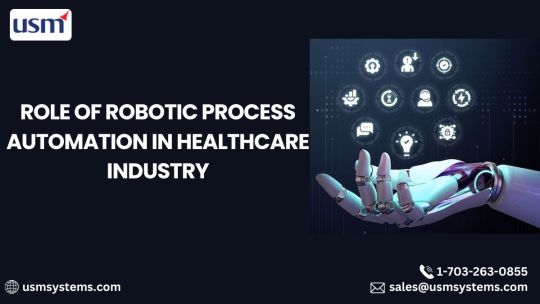
Applications of Robotic Process Automation in Healthcare
Robotic Process Automation (RPA) is transforming the healthcare sector by streamlining repetitive tasks. Key applications include patient data management, appointment scheduling, claims processing, and inventory tracking. By reducing human error and enhancing efficiency, RPA ensures better resource allocation and improved patient care. With expertise in healthcare automation, USM Business Systems stands out as the best mobile app development company, providing cutting-edge RPA solutions for healthcare businesses.
#Robotic process automation in healthcare#RPA applications in healthcare#Healthcare automation benefits#RPA for medical billing#Automation in patient management#RPA in healthcare operations#Healthcare efficiency with RPA#Robotic automation in hospitals#RPA in claims processing#RPA for healthcare workflows#AI and RPA in healthcare#Digital transformation in healthcare#RPA in patient data management#Automation for medical records#RPA in healthcare industry
0 notes
Text
Tailored Services: RPA Services for the Manufacturing Industry
There is a broad range of other RPA use cases in manufacturing apart from the above-mentioned ones in the vast manufacturing industry. If you feel like your business is not moving into the digital age quickly enough and existing systems are too complex or old to integrate and automate, then ESS RPA consultants can help you to move forward with your RPA goals faster.
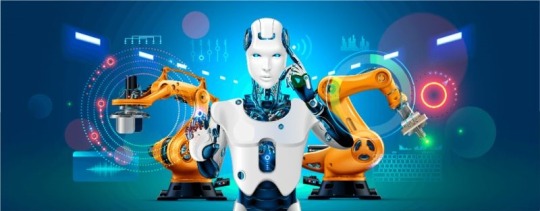
Elevate your manufacturing with specialized RPA services. Unlock tailored solutions that optimize processes and drive efficiency in your industry.
#RPA in manufacturing industry#RPA in manufacturing sector#Manufacturing RPA use cases#Benefits of RPA in manufacturing#RPA manufacturing use cases#Robotic process automation for manufacturing#RPA in manufacturing use cases#RPA services for manufacturing industry#Robotic process automation use cases in manufacturing#RPA manufacturing case study#Robotic process automation for manufacturing companies#Manufacturing RPA#Robotic process automation manufacturing#Robotic process automation in manufacturing#Manufacturing use cases in RPA#Robotic process automation in manufacturing industry#RPA use cases in manufacturing industry#RPA for manufacturing#RPA manufacturing#RPA in manufacturing
0 notes
Text
Video Agent: The Future of AI-Powered Content Creation

The rise of AI-generated content has transformed how businesses and creators produce videos. Among the most innovative tools is the video agent, an AI-driven solution that automates video creation, editing, and optimization. Whether for marketing, education, or entertainment, video agents are redefining efficiency and creativity in digital media.
In this article, we explore how AI-powered video agents work, their benefits, and their impact on content creation.
What Is a Video Agent?
A video agent is an AI-based system designed to assist in video production. Unlike traditional editing software, it leverages machine learning and natural language processing (NLP) to automate tasks such as:
Scriptwriting – Generates engaging scripts based on keywords.
Voiceovers – Converts text to lifelike speech in multiple languages.
Editing – Automatically cuts, transitions, and enhances footage.
Personalization – Tailors videos for different audiences.
These capabilities make video agents indispensable for creators who need high-quality content at scale.
How AI Video Generators Work
The core of a video agent lies in its AI algorithms. Here’s a breakdown of the process:
1. Input & Analysis
Users provide a prompt (e.g., "Create a 1-minute explainer video about AI trends"). The AI video generator analyzes the request and gathers relevant data.
2. Content Generation
Using GPT-based models, the system drafts a script, selects stock footage (or generates synthetic visuals), and adds background music.
3. Editing & Enhancement
The video agent refines the video by:
Adjusting pacing and transitions.
Applying color correction.
Syncing voiceovers with visuals.
4. Output & Optimization
The final video is rendered in various formats, optimized for platforms like YouTube, TikTok, or LinkedIn.
Benefits of Using a Video Agent
Adopting an AI-powered video generator offers several advantages:
1. Time Efficiency
Traditional video production takes hours or days. A video agent reduces this to minutes, allowing rapid content deployment.
2. Cost Savings
Hiring editors, voice actors, and scriptwriters is expensive. AI eliminates these costs while maintaining quality.
3. Scalability
Businesses can generate hundreds of personalized videos for marketing campaigns without extra effort.
4. Consistency
AI ensures brand voice and style remain uniform across all videos.
5. Accessibility
Even non-experts can create professional videos without technical skills.
Top Use Cases for Video Agents
From marketing to education, AI video generators are versatile tools. Key applications include:
1. Marketing & Advertising
Personalized ads – AI tailors videos to user preferences.
Social media content – Quickly generates clips for Instagram, Facebook, etc.
2. E-Learning & Training
Automated tutorials – Simplifies complex topics with visuals.
Corporate training – Creates onboarding videos for employees.
3. News & Journalism
AI-generated news clips – Converts articles into video summaries.
4. Entertainment & Influencers
YouTube automation – Helps creators maintain consistent uploads.
Challenges & Limitations
Despite their advantages, video agents face some hurdles:
1. Lack of Human Touch
AI may struggle with emotional nuance, making some videos feel robotic.
2. Copyright Issues
Using stock footage or AI-generated voices may raise legal concerns.
3. Over-Reliance on Automation
Excessive AI use could reduce creativity in content creation.
The Future of Video Agents
As AI video generation improves, we can expect:
Hyper-realistic avatars – AI-generated presenters indistinguishable from humans.
Real-time video editing – Instant adjustments during live streams.
Advanced personalization – AI predicting viewer preferences before creation.
2 notes
·
View notes
Text
Thailand SMART Visa
Thailand’s Smart Visa program represents a strategic initiative by the Thai government to attract top-tier foreign talent, investors, and entrepreneurs in targeted high-value industries. Unlike conventional work visas, the Smart Visa offers longer validity, reduced bureaucratic hurdles, and exclusive privileges tailored for professionals in technology, innovation, and advanced industries.
This comprehensive guide provides an in-depth, expert-level analysis of the Smart Visa, covering:
Visa categories and eligibility criteria
Application process and required documentation
Key benefits and limitations
Strategic advantages for businesses and individuals
Long-term residency pathways
1. Understanding the Smart Visa: Purpose and Target Sectors
Launched in 2018 by the Thailand Board of Investment (BOI) in collaboration with the Digital Economy Promotion Agency (DEPA), the Smart Visa is designed to: ✔ Accelerate Thailand’s transition into a digital and innovation-driven economy ✔ Attract foreign expertise in AI, robotics, biotech, fintech, and advanced manufacturing ✔ Encourage high-value investment in priority industries
Targeted Industries
The Smart Visa is available for professionals and businesses in the following sectors:
Next-generation automotive (EVs, smart mobility)
Smart electronics and IoT
Advanced agriculture and biotechnology
Automation and robotics
Digital and direct-to-consumer (DTC) startups
Financial technology (Blockchain, digital banking)
Aerospace and aviation tech
2. Smart Visa Categories: Which One Fits Your Profile?
The Smart Visa is divided into four distinct categories, each with specific eligibility criteria:
A. Smart-T (Talent Visa) – For High-Skilled Professionals
✔ Who qualifies?
Experts in AI, machine learning, cybersecurity, biotech, or advanced engineering
Minimum salary of 200,000 THB/month (lower thresholds possible for BOI-backed companies)
Must be employed by a Thai company in a BOI-promoted sector
✔ Key benefits:
No work permit required
Permission to work for multiple companies (with approval)
B. Smart-I (Investor Visa) – For High-Net-Worth Investors
✔ Who qualifies?
Minimum investment of 20 million THB in a Thai tech company or startup
Investment must align with BOI’s priority sectors
✔ Key benefits:
No minimum stay requirement
Family members eligible for dependent visas
C. Smart-E (Executive Visa) – For Senior Corporate Leaders
✔ Who qualifies?
C-level executives or directors in BOI-promoted companies
Minimum salary of 200,000 THB/month
✔ Key benefits:
Fast-tracked immigration processing
Exemption from re-entry permits
D. Smart-S (Startup Visa) – For Tech Entrepreneurs
✔ Who qualifies?
Founders of registered startups in Thailand
Must be endorsed by DEPA or a BOI-approved incubator
Minimum 50,000 USD funding or participation in a recognized accelerator
✔ Key benefits:
Access to Thai startup ecosystem and funding networks
Easier business registration processes
3. Step-by-Step Application Process
Step 1: Determine Eligibility & Gather Documents
For Employees (Smart-T, Smart-E):
Employment contract
Company’s BOI certification (if applicable)
Proof of salary (tax documents, bank statements)
For Investors (Smart-I):
Proof of investment (bank transfer, share certificates)
BOI investment approval letter
For Startups (Smart-S):
Business registration documents
Proof of funding (venture capital, accelerator acceptance)
Step 2: Submit Application to the Smart Visa Unit
Applications can be filed online or at the One Start One Stop Investment Center (OSOS) in Bangkok.
Processing time: 3-4 weeks.
Step 3: Visa Issuance & Entry into Thailand
Initial visa validity: Up to 4 years (renewable).
No 90-day reporting required (unlike standard visas).
4. Key Benefits: Why Choose the Smart Visa?
FeatureSmart VisaStandard Work VisaVisa ValidityUp to 4 years1 year (renewable)Work PermitNot requiredRequired90-Day ReportingExemptMandatoryDependent VisasSpouse & children eligibleSpouse eligible (with restrictions)Income Tax BenefitsPossible exemptionsStandard taxation
Additional Perks:
✔ Multiple re-entry permits without additional paperwork ✔ Spouse can work legally (subject to approval) ✔ Fast-tracked permanent residency pathway
5. Challenges & Considerations
A. Strict Eligibility Requirements
High salary thresholds (200,000 THB/month for Smart-T/E)
BOI/DEPA endorsement mandatory (limits flexibility for non-tech professionals)
B. Limited Scope Outside Tech & Investment
Traditional industries (e.g., hospitality, education) excluded
No provisions for freelancers or digital nomads
C. Bureaucratic Hurdles for Startups
Startup Visa requires accelerator backing, which can be competitive
6. Long-Term Strategic Advantages
A. Gateway to Permanent Residency & Citizenship
After 3+ years, Smart Visa holders can apply for permanent residency.
Elite Visa upgrade possible for long-term stays beyond 4 years.
B. Access to Thailand’s Booming Tech Ecosystem
Eastern Economic Corridor (EEC) offers tax breaks for tech firms.
Growing VC funding in AI, fintech, and biotech.
C. Regional Business Expansion
Thailand’s strategic ASEAN location makes it ideal for scaling businesses across Southeast Asia.
7. Expert Tips for a Successful Application
✔ Consult with a BOI-certified lawyer to ensure compliance. ✔ Maintain clear financial records (especially for investment visas). ✔ Prepare for potential immigration interviews (some offices require in-person verification).
Conclusion
The Thailand Smart Visa is one of the most attractive long-term visa options for high-skilled professionals, investors, and startup founders. With 4-year validity, work permit exemptions, and a streamlined process, it offers unparalleled advantages over traditional visas.
However, its strict eligibility criteria mean it is best suited for those in tech, advanced industries, or with significant investment capital. For qualifying individuals, it provides a direct pathway to Thailand’s innovation economy and long-term residency.
Final Recommendation:
If you work in AI, robotics, biotech, or digital startups, the Smart Visa is ideal.
For investors, the 20M THB threshold is steep but offers long-term stability.
Startups should secure accelerator backing early to qualify for the Smart-S visa.
#thailand#immigration#visa#thaivisa#thailandvisa#visainthailand#thailandsmartvisa#smartvisa#thaismartvisa
2 notes
·
View notes
Text
Thailand SMART Visa
Thailand’s Smart Visa is a specialized visa program designed to attract high-skilled professionals, investors, entrepreneurs, and startup founders to contribute to the country’s growing technology, innovation, and digital economy sectors. Unlike standard work visas, the Smart Visa offers extended stay privileges, streamlined processes, and exemptions from certain bureaucratic hurdles.
This article provides an in-depth analysis of the Thailand Smart Visa, covering its eligibility criteria, benefits, application process, and strategic advantages for foreign talent and businesses.
1. Overview of the Thailand Smart Visa
Launched in 2018 by the Thailand Board of Investment (BOI) and the Digital Economy Promotion Agency (DEPA), the Smart Visa targets individuals in high-value industries, including:
Advanced technology (AI, IoT, robotics, automation)
Digital and tech startups
Research and development (R&D)
Corporate investment in targeted sectors
The visa is structured into four categories:
Smart-T (Talent) – For highly skilled professionals in tech and innovation.
Smart-I (Investor) – For investors in BOI-promoted industries.
Smart-E (Executive) – For senior executives in tech-driven companies.
Smart-S (Startup) – For founders of high-potential startups.
2. Key Benefits of the Smart Visa
The Smart Visa provides significant advantages over traditional Thai work visas:
A. Extended Stay and Multiple Entry
Initial validity of up to 4 years (renewable)
No 90-day reporting requirement (unlike standard visas)
Multiple re-entry permits without additional paperwork
B. Work and Business Flexibility
No work permit required (unlike standard employment visas)
Permission to work for multiple entities (with approval)
Fast-tracked approvals for BOI-backed companies
C. Family and Dependent Privileges
Spouse and children eligible for dependent visas
Spouse permitted to work (subject to approval)
Children allowed to study in Thailand
D. Tax and Investment Incentives
Potential corporate tax exemptions for BOI-approved companies
Personal income tax benefits for qualifying expatriates
3. Eligibility Requirements
Each Smart Visa category has specific qualifications:
A. Smart-T (Talent Visa)
✔ Highly skilled professionals in AI, robotics, biotech, fintech, or digital industries ✔ Minimum salary of 200,000 THB/month (or lower in some cases with BOI approval) ✔ Employed by a Thai company in a BOI-promoted sector
B. Smart-I (Investor Visa)
✔ Minimum investment of 20 million THB in a Thai tech or innovation company ✔ Investment must align with BOI priority sectors
C. Smart-E (Executive Visa)
✔ Senior executives or experts in BOI-promoted companies ✔ Minimum salary of 200,000 THB/month
D. Smart-S (Startup Visa)
✔ Founders of tech startups with funding or accelerator backing ✔ Startup must be registered in Thailand and endorsed by DEPA or BOI
4. Application Process
The Smart Visa application involves multiple steps:
Company or Individual Qualification Check
The employer or investor must ensure eligibility under BOI/DEPA criteria.
Submission to the Smart Visa Unit
Documents include:
Passport copy
Employment contract (for Smart-T/E)
Investment proof (for Smart-I)
Startup business plan (for Smart-S)
Approval and Visa Issuance
Processing time: ~3-4 weeks
Visa issued at a Thai embassy or through an in-country conversion.
5. Strategic Advantages for Foreign Professionals & Businesses
A. Access to Thailand’s Booming Tech Ecosystem
Thailand is rapidly expanding in AI, blockchain, and smart manufacturing, making it a hub for tech talent.
Eastern Economic Corridor (EEC) offers infrastructure and tax incentives for tech firms.
B. Easier Compliance Than Standard Work Visas
No work permit renewals or cumbersome paperwork.
Greater mobility for regional business operations.
C. Pathway to Long-Term Residency
Smart Visa holders may qualify for Thailand’s Elite Visa or PR after meeting residency requirements.
6. Challenges and Considerations
Despite its benefits, the Smart Visa has some limitations:
Stringent salary and investment thresholds may exclude mid-level professionals.
BOI/DEPA endorsement required, adding complexity for startups without government backing.
Limited to specific industries, excluding non-tech sectors.
7. Conclusion
The Thailand Smart Visa is a game-changer for high-value expatriates, investors, and entrepreneurs looking to engage with Thailand’s innovation-driven economy. With long-term stay benefits, work flexibility, and tax incentives, it stands out as one of the most attractive visa programs in Southeast Asia.
However, its strict eligibility criteria mean it is best suited for top-tier professionals and well-funded startups. For those who qualify, it provides an unparalleled advantage in Thailand’s competitive tech and business landscape.
For further details, applicants should consult the Thailand Board of Investment (BOI) or the Smart Visa official website.
Final Thoughts
Thailand’s Smart Visa reflects the country’s strategic push toward digital transformation and foreign talent acquisition. As the program evolves, we may see expanded categories and relaxed requirements to attract a broader range of skilled professionals.
#thailand#immigration#immigrationinthailand#thai#thaiimmigration#thaivisa#visa#thailandsmartvisa#smartvisa#visainthailand#thaismartvisa
2 notes
·
View notes